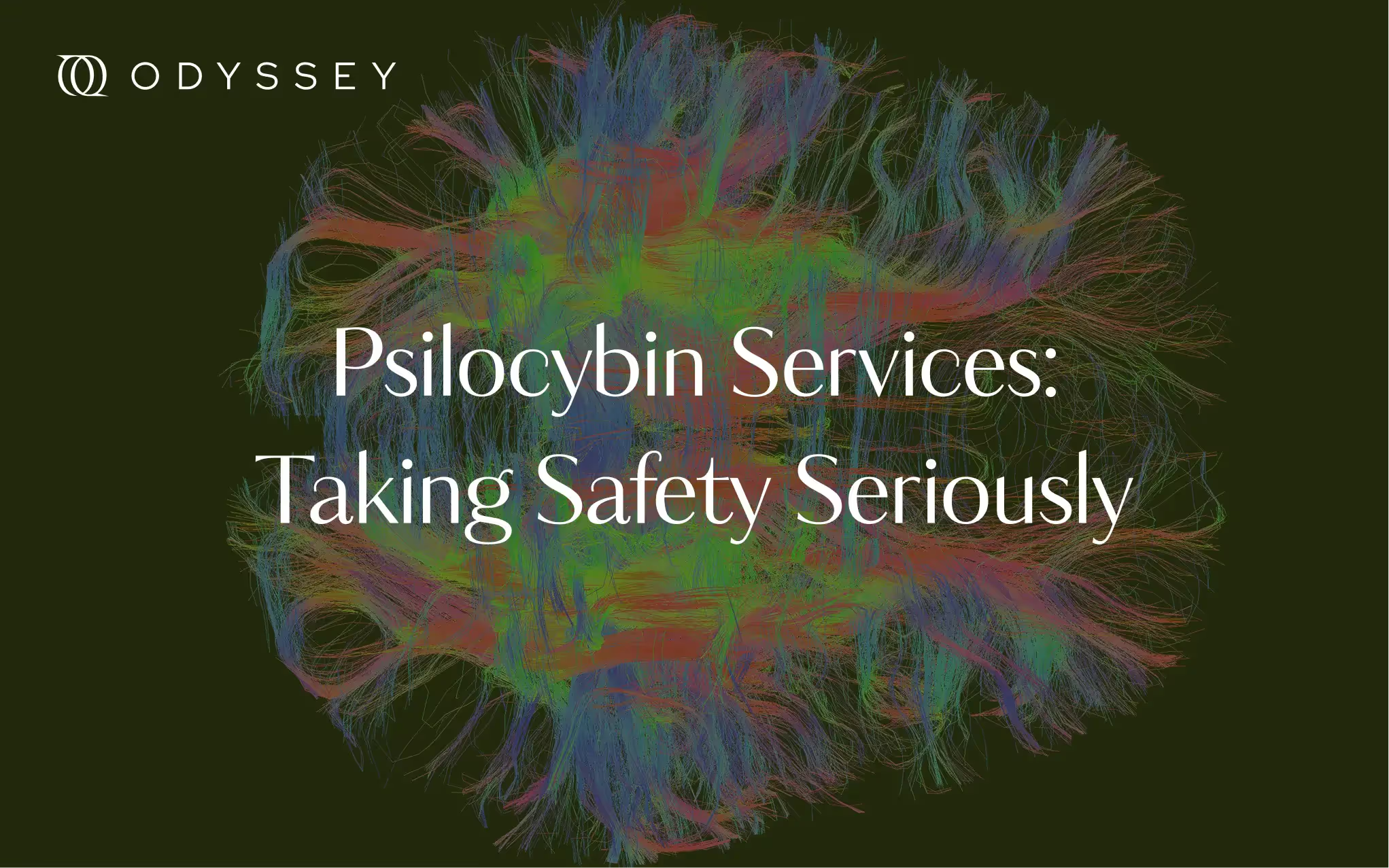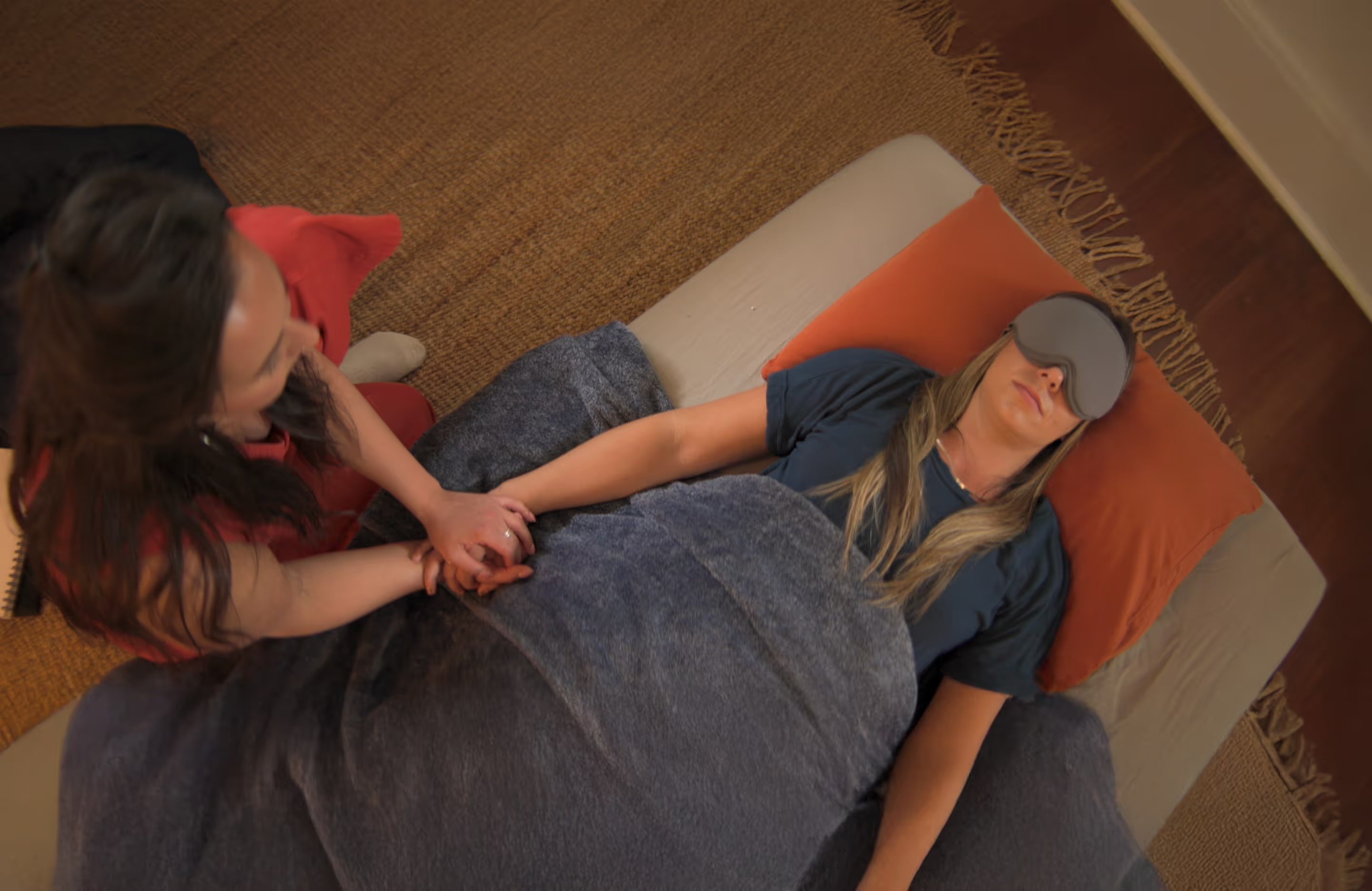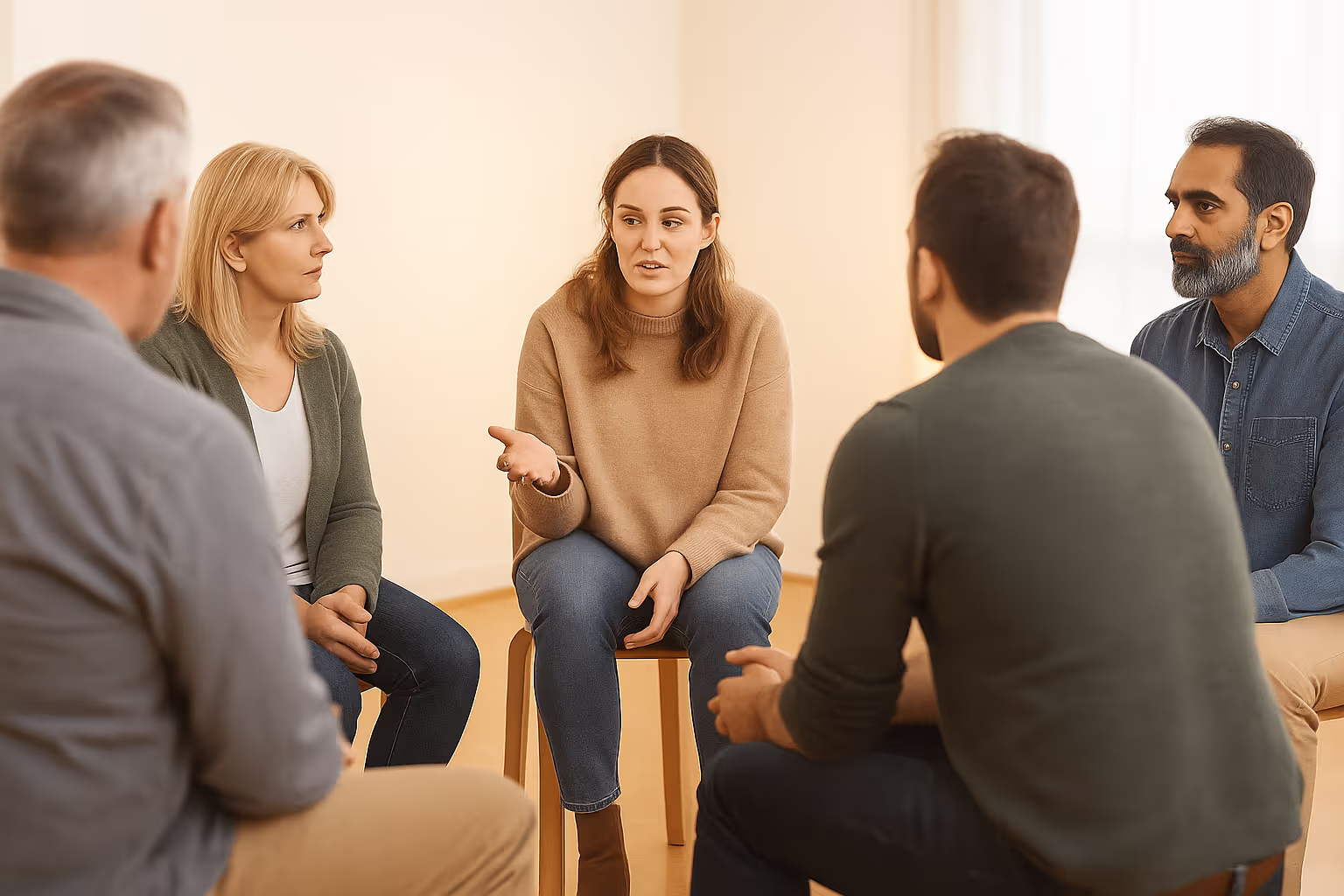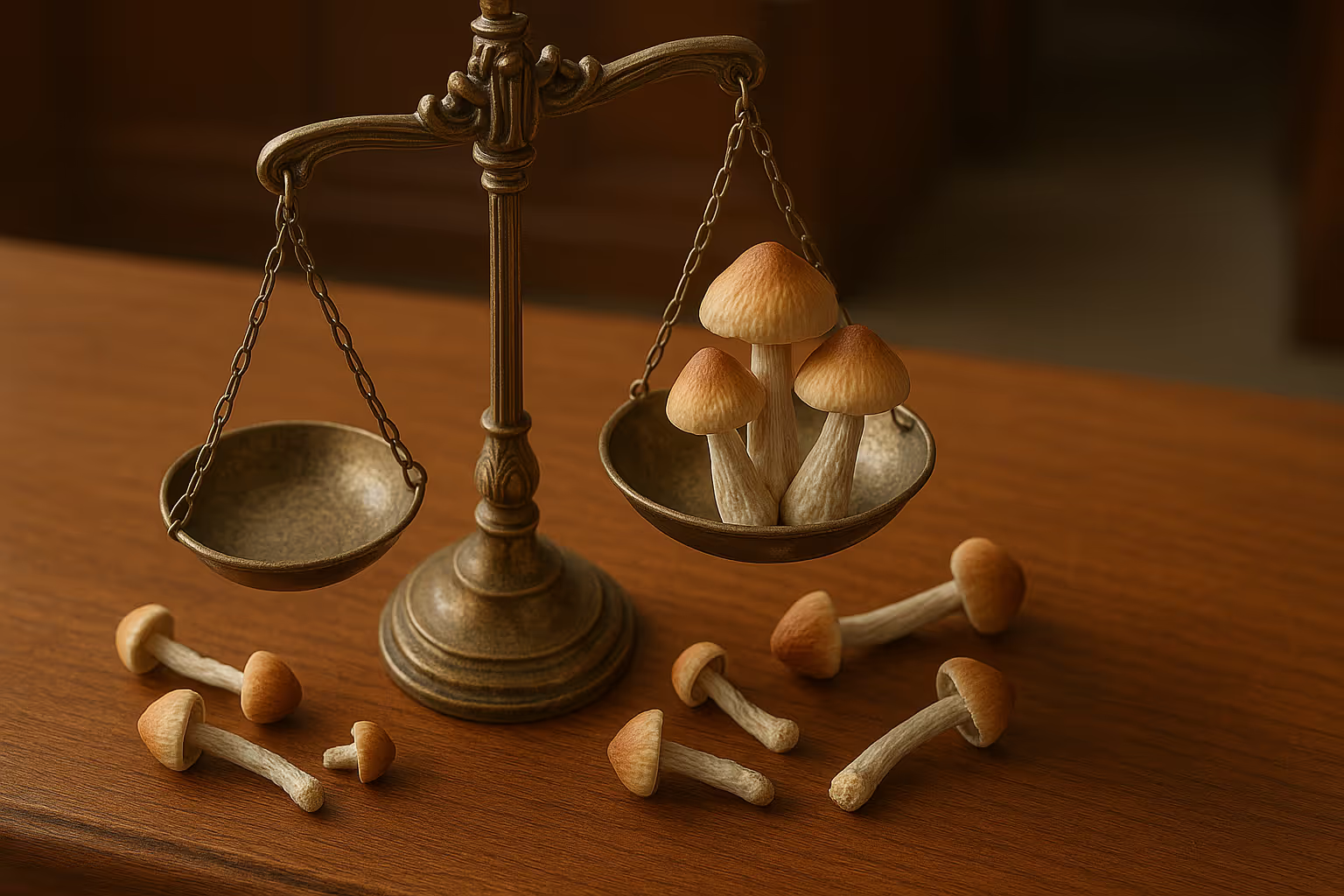Psilocybin Services: Taking Safety Seriously

Safety is our highest priority. Psilocybin experiences can be extremely powerful, and we believe they should be handled with intention, care, and respect. Accordingly, safety has been thoroughly considered through every step of the Odyssey process. This article describes the many ways in which we’re prioritizing safety.
Screening and Intake
The screening and intake process is one of the most important components of safety. Our in-depth, professionally designed process ensures that many of the potential risks of a psilocybin experience are minimized, or mitigated completely, before preparation for the session even begins.
The Odyssey screening process takes into consideration the following elements:
Prescription Medications and Supplements
Certain prescription medications and supplements may interact with psilocybin.1 These medications include common antidepressants such as SSRIs, SNRIs, Bupropion (Wellbutrin), and others. Most of these interactions are not dangerous, however they may impact the experience in other ways (e.g. by diminishing or blunting psilocybin’s psychedelic effects).2,3
The prescription medication lithium (Eskalith, Lithobid) does pose a significant safety risk if used in combination with psilocybin.4 In accordance with Oregon Health Authority regulations, individuals who have taken lithium within the last 30 days will not be permitted to access psilocybin services with Odyssey.5
Potential interactions with other prescription medications and supplements are addressed in detail in our screening and intake process.
Physiological Safety of Psilocybin
Psilocybin is generally physiologically safe and well-tolerated.6 It can moderately increase heart rate and blood pressure, but even at high doses, this effect is mild.7 Regardless, individuals with a history of serious cardiac conditions or uncontrolled high blood pressure should exercise caution. In a case like this, we may require that an individual undertake additional measures to ensure their safety (e.g. receiving clearance from their physician before proceeding with Odyssey services).
Nausea is a potential side effect of psilocybin, and if an individual is particularly prone to nausea, it’s helpful for our team to know ahead of time. A history of allergic reaction to mushrooms or fungi could also present a risk. Post-experience headaches are a common side effect of medium-high dose psilocybin, and these can be mitigated with over-the-counter pain medication, which will be available.8 These potential risks and others are addressed in detail in our screening and intake process.
Psychological Safety of Psilocybin
A strong psychedelic experience may exacerbate or trigger the onset of certain psychiatric disorders, such as schizophrenia.7 Individuals with a personal or family history of these conditions should exercise caution.
In most modern clinical trials and psychedelic research studies, individuals with a first or second-degree relative with schizophrenia, bipolar, or other psychotic disorders are excluded from participation. A first degree relative is a parent or sibling. A second-degree relative is an uncle, aunt, nephew, niece, grandparent, half-sibling, or double-cousin.
Age and gender likely impact the degree of risk, as these conditions tend to onset in the early-mid twenties for men and the late twenties to early thirties for women.9,10 Prior psychedelic experience with no adverse effects also suggests lower risk.
This topic is complex, and research in this area is limited and sometimes contradictory, making it difficult to draw strong conclusions. For example, in the case of bipolar disorder, a pilot study published in 2023 found no increase in mania or hypomania symptoms following a single dose of psilocybin in individuals with Bipolar II.11 However, a survey study of over 500 individuals with bipolar disorder found that one-third of respondents described new and/or increasing symptoms after psilocybin experiences, prominently manic symptoms, difficulties sleeping, and anxiety, with no difference between those with Bipolar I or II. Notably, respondents in this survey indicated that, on balance, they found psilocybin more helpful than harmful.12
In summary, current evidence suggests caution is warranted for individuals with personal or family histories of schizophrenia, bipolar, or other psychotic disorders, and that more research in this area is needed. These potential risks are addressed in detail in our screening and intake process.
Support Network
The intensity of a strong psychedelic experience can be disruptive or destabilizing for some individuals in certain cases. While it may be challenging at the time, this is often part of a larger healing, transformational, or therapeutic process. Nevertheless, it’s important to account for the potential of disruption or destabilization and plan for the possibility of turbulence in your life, should it occur.
Having a strong support network that can help process the experience is one of the best ways to mitigate any potential negative impact of a disruptive or destabilizing psychedelic journey. This network may include family, friends, a therapist, and/or other forms of community support. The key is that the individuals be both aware of, and supportive of, your undergoing a psychedelic experience.
Framing and Expectation Management
Extensive media coverage, which often focuses on the most exceptional and extraordinary experiences that are possible with psychedelic therapy, has led to an increase in heightened positive expectations from people interested in these substances.13
Of course, it’s natural that a desire for a positive experience or outcome would draw us to something, but we encourage viewing a psilocybin experience as part of an ongoing process, and not a “quick fix” or “silver bullet”. While certain research has shown significant, lasting benefits from a single session, it’s impossible to predict the exact outcome of a particular psychedelic experience for any individual.14
Ideally, a psilocybin experience takes place in the context of broader psychological and emotional work. This may include psychotherapy, which we recommend engaging in before and after your experience. It may also include practices such as meditation or journaling, which have been shown in research to support personal work with psychedelics.15
Consensus among researchers, practitioners, and the broader community is that it’s beneficial to enter a journey with openness, and let go of expectations or desires for a specific experience or outcome.
Challenging Experiences or “Bad Trips”
Odyssey’s process provides multiple layers of support around the potential for challenging experiences with psilocybin (sometimes colloquially known as “bad trips”). Important to note is that it’s common for aspects of a psychedelic experience to be challenging, and that this is no cause for concern. Intense emotions such as sadness, anger, and fear can be and often are part of a journey. Psilocybin can help us face challenging parts of ourselves, process grief and loss, and heal from past trauma. Naturally, this is challenging work.
Commonly, challenges experienced during a journey are later viewed as positive, and ultimately felt to have been necessary or worthwhile.16,17 Most challenging psilocybin experiences - including those that occur outside of supervised settings - fall under this category. Less common, but still possible, are challenging experiences that create difficulties in the days, weeks, months, or even years after the experience. Challenging experiences of this type are less likely to occur when intentional preparation, “set and setting”, professional support, integration, and other considerations are taken into account.18 In the next section, we explore the long-term safety of psilocybin.
The Odyssey process is designed to support the integration of any and all experiences that arise during a session, including challenges. Rest assured that regardless of the intensity or duration of any challenges, you won’t be left alone to process. See the “Integration and Aftercare” section below for more details.
Long-Term Safety of Psilocybin
When administered in a research setting, psilocybin has proven to be safe in both the short and long-term. Less than 1% of 360 participants in psilocybin studies in Switzerland and Johns Hopkins University experienced post-session negative symptoms from psilocybin.19,20 In these few cases, symptoms resolved with additional psychological support (counseling or psychotherapy).
A systematic review of over 30 psychedelic research studies found that with proper screening, preparation, supervision, and integration, limited aversive side effects were reported by participants.21
A 2016 study from NYU reported the following:
“Since the early 1990s, approximately 2000 doses of psilocybin (ranging from low to high doses) have been safely administered to humans in the United States and Europe, in carefully controlled scientific settings, with no reports of any medical or psychiatric serious adverse effects, including no reported cases of prolonged psychosis or HPPD.”22
Several studies have also examined the relationship between psychedelic use and mental health at the population level. A study of over 100,000 US adults found no associations between lifetime psychedelic use and increased rates of mental illness.23 In a similar study of over 20,000 US adults, psychedelics were not linked to mental health problems or suicidal behavior.24 A 2015 study found that classic psychedelic use is associated with reduced psychological distress and suicidality in the US adult population.25
However, psilocybin is not without long-term risk. One study analyzed almost 2,000 respondents’ single most challenging psilocybin experience (worst “bad trip”), and found that 24% reported experiencing one or more negative psychological symptoms that lasted a week or longer after the psilocybin session, which they attributed to the session. The most common symptoms were anxiety, paranoia, depression, and fear. 10% reported symptom(s) lasting more than a year after the experience, with 7.6% seeking professional treatment for the symptom(s). Notably, this same study found that 84% of respondents reported having benefited from the experience, with 76% reporting increased well-being or life satisfaction attributed to the experience. Fewer than 3% of respondents had a trusted, sober, experienced guide present, and over half reported consuming another substance in addition to psilocybin.17
Another survey study of over 600 respondents analyzed extended difficulties following the use of psychedelic substances including ayahuasca, LSD, MDMA, and psilocybin. Duration of difficulties ranged from less than one week (12.5%) to more than three years (16.9%). Extended difficulties were predicted by being in an unguided setting, degree and duration of challenging experience, and not having knowledge of dose.26 All of these factors point towards the benefits of having professional facilitation support available before, during, and after a session. Odyssey’s facilitators are trained, compassionate, and well equipped to support individuals through any challenges they may encounter.
Hallucinogen Persisting Perception Disorder (HPPD) is one potential long-term negative side effect of psychedelic use. The incidence of HPPD is low, and not well understood.6 HPPD is most commonly caused by LSD, cannabis, or MDMA use, and less commonly by psilocybin use.27 It’s also most commonly caused by heavy substance use and/or multiple substances used in combination.27 No cases of HPPD have occurred in volunteers given psilocybin in contemporary research studies.19, 20
Evidence suggests that when administered in a controlled setting with professional support, psilocybin is safe and the potential for negative long-term impact is low. This is, in part, why the end-to-end Odyssey experience is modeled on best practices used in modern clinical trials and psychedelic research studies.
Discover how our protocols are grounded in science and evidence
Facilitation Team
One of the strongest contributing factors to a safe and positive guided psilocybin experience is the qualities and characteristics of the session facilitator(s). An exceptional facilitator can be the difference between a journey that is confusing, disorienting, or unsafe, and one that is smooth, safe, and comfortable. Needless to say, this consideration is hugely important.
Odyssey’s facilitators are carefully selected according to a range of criteria that includes background, experience, training, and approach. We look first and foremost for facilitators with a strong, warm, compassionate, and wise presence. Another essential criterion for facilitator selection is to ask ourselves, “Would I send a close family member to work with this person?” The answer for every facilitator at Odyssey is a resounding “Yes!”
Odyssey’s facilitators follow a non-directive approach, which is the style of support used in modern clinical trials and psychedelic research studies.28,29 A non-directive approach means that facilitators provide warm, compassionate support and empathetic presence, without attempting to direct an individual’s experience.
Explore our experienced facilitation team and their qualifications
Integration and Aftercare
An intentional integration process is as important, if not more important than the psychedelic experience itself. Integration is essential for transforming the insights and understandings from a journey into lasting, sustainable positive change in one’s life.
For the vast majority of individuals, integration will be an engaging, fruitful process that may at times require substantial energy and effort. Odyssey’s services are designed to fully support this process, and we provide a package of integration resources post-journey. Group retreats include a full day for integration, with activities designed to harness the post-journey neural plasticity and maximize its benefits. Private sessions include two hour-long, one-on-one integration calls with a facilitator in the weeks following the session.
A small minority of individuals may encounter challenges that endure beyond their psilocybin session. We’re committed to supporting you through whatever arises, even if that means extending additional services and support to you, at no additional cost. We are pleased to offer financial assistance and access to our extensive support network to anyone in this position post-Odyssey experience.
Conclusion
Safety has been thoroughly considered through every step of the Odyssey experience. Our screening and intake process is professionally designed to minimize or mitigate as many potential risks as possible before a session even begins. Our team follows the latest developments in psychedelic science, and updates our processes based on the literature.
We recommend individuals have a strong support network in place before a session, which may include family, friends, a therapist, and/or other forms of community support. We also recommend viewing a psilocybin experience as part of a broader process, cultivating an attitude of openness, and letting go of desires or expectations for a specific experience or outcome.
The Odyssey process provides multiple layers of protection and support around challenging experiences or “bad trips”. Overall, challenging experiences are much less likely to occur because intentional preparation, integration, “set and setting”, professional support, and other considerations are taken into account.
The likelihood of negative post-session symptoms is low. Psilocybin, especially when administered in a controlled setting with professional support, appears largely safe in the long term, based on evidence from both contemporary research studies and population-level data analysis.
Odyssey’s facilitators are highly vetted, trained individuals who embody a strong, warm, compassionate, and wise presence. Our facilitators use a non-directive approach, in line with the style of support used in contemporary psychedelic research.
Integration is key to any intentional psychedelic experience, and our process is designed to support this. For most people, this will be engaging, fruitful, and perhaps effortful. Although rare, some individuals may experience challenges that persist beyond the session itself. In cases like these, Odyssey is pleased to offer additional support, including financial assistance and access to our extensive support network.
References
1. Sarparast, A., Thomas, K., Malcolm, B., & Stauffer, C. S. (2022). Drug-drug interactions between psychiatric medications and MDMA or psilocybin: a systematic review. Psychopharmacology, 239(6), 1945–1976. https://doi.org/10.1007/s00213-022-06083-y
2. Malcolm, B., & Thomas, K. (2022). Serotonin toxicity of serotonergic psychedelics. Psychopharmacology, 239(6), 1881–1891. https://doi.org/10.1007/s00213-021-05876-x
3. Gukasyan, N., Griffiths, R. R., Yaden, D. B., Antoine, D. G., 2nd, & Nayak, S. M. (2023). Attenuation of psilocybin mushroom effects during and after SSRI/SNRI antidepressant use. Journal of psychopharmacology (Oxford, England), 37(7), 707–716. https://doi.org/10.1177/02698811231179910
4. Nayak, S. M., Gukasyan, N., Barrett, F. S., Erowid, E., Erowid, F., & Griffiths, R. R. (2021). Classic Psychedelic Coadministration with Lithium, but Not Lamotrigine, is Associated with Seizures: An Analysis of Online Psychedelic Experience Reports. Pharmacopsychiatry, 54(5), 240–245. https://doi.org/10.1055/a-1524-2794
5. Oregon Health Authority. OAR 333-333-4000 Application Process. Available from: https://secure.sos.state.or.us/oard/displayDivisionRules.action?selectedDivision=7102.
6. Nichols D. E. (2016). Psychedelics. Pharmacological reviews, 68(2), 264–355. https://doi.org/10.1124/pr.115.011478
7. Johnson, M., Richards, W., & Griffiths, R. (2008). Human hallucinogen research: guidelines for safety. Journal of psychopharmacology (Oxford, England), 22(6), 603–620. https://doi.org/10.1177/0269881108093587
8. Johnson, M. W., Sewell, R. A., & Griffiths, R. R. (2012). Psilocybin dose-dependently causes delayed, transient headaches in healthy volunteers. Drug and alcohol dependence, 123(1-3), 132–140. https://doi.org/10.1016/j.drugalcdep.2011.10.029
9. Kennedy, N., Boydell, J., Kalidindi, S., Fearon, P., Jones, P. B., van Os, J., & Murray, R. M. (2005). Gender differences in incidence and age at onset of mania and bipolar disorder over a 35-year period in Camberwell, England. The American journal of psychiatry, 162(2), 257–262. https://doi.org/10.1176/appi.ajp.162.2.257
10. Fountoulakis, K. N., Dragioti, E., Theofilidis, A. T., Wiklund, T., Atmatzidis, X., Nimatoudis, I., Thys, E., Wampers, M., Hranov, L., Hristova, T., Aptalidis, D., Milev, R., Iftene, F., Spaniel, F., Knytl, P., Furstova, P., From, T., Karlsson, H., Walta, M., Salokangas, R. K. R., … De Hert, M. (2022). Gender, age at onset, and duration of being ill as predictors for the long-term course and outcome of schizophrenia: an international multicenter study. CNS spectrums, 27(6), 716–723. https://doi.org/10.1017/S1092852921000742
11. Aaronson, S. T., van der Vaart, A., Miller, T., LaPratt, J., Swartz, K., Shoultz, A., Lauterbach, M., Sackeim, H. A., & Suppes, T. (2023). Single-Dose Synthetic Psilocybin With Psychotherapy for Treatment-Resistant Bipolar Type II Major Depressive Episodes: A Nonrandomized Controlled Trial. JAMA psychiatry, e234685. Advance online publication. https://doi.org/10.1001/jamapsychiatry.2023.4685
12. Morton, E., Sakai, K., Ashtari, A., Pleet, M., Michalak, E. E., & Woolley, J. (2023). Risks and benefits of psilocybin use in people with bipolar disorder: An international web-based survey on experiences of 'magic mushroom' consumption. Journal of psychopharmacology (Oxford, England), 37(1), 49–60. https://doi.org/10.1177/02698811221131997
13. Aday, J. S., Heifets, B. D., Pratscher, S. D., Bradley, E., Rosen, R., & Woolley, J. D. (2022). Great Expectations: recommendations for improving the methodological rigor of psychedelic clinical trials. Psychopharmacology, 239(6), 1989–2010. https://doi.org/10.1007/s00213-022-06123-7
14. Raison, C. L., Sanacora, G., Woolley, J., Heinzerling, K., Dunlop, B. W., Brown, R. T., Kakar, R., Hassman, M., Trivedi, R. P., Robison, R., Gukasyan, N., Nayak, S. M., Hu, X., O'Donnell, K. C., Kelmendi, B., Sloshower, J., Penn, A. D., Bradley, E., Kelly, D. F., Mletzko, T., … Griffiths, R. R. (2023). Single-Dose Psilocybin Treatment for Major Depressive Disorder: A Randomized Clinical Trial. JAMA, 330(9), 843–853. https://doi.org/10.1001/jama.2023.14530
15. Griffiths, R. R., Johnson, M. W., Richards, W. A., Richards, B. D., Jesse, R., MacLean, K. A., Barrett, F. S., Cosimano, M. P., & Klinedinst, M. A. (2018). Psilocybin-occasioned mystical-type experience in combination with meditation and other spiritual practices produces enduring positive changes in psychological functioning and in trait measures of prosocial attitudes and behaviors. Journal of psychopharmacology (Oxford, England), 32(1), 49–69. https://doi.org/10.1177/0269881117731279
16. Johnstad, Petter. (2021). Day trip to hell: A mixed methods study of challenging psychedelic experiences. Journal of Psychedelic Studies. 5. 10.1556/2054.2021.00155.
17. Carbonaro, T. M., Bradstreet, M. P., Barrett, F. S., MacLean, K. A., Jesse, R., Johnson, M. W., & Griffiths, R. R. (2016). Survey study of challenging experiences after ingesting psilocybin mushrooms: Acute and enduring positive and negative consequences. Journal of psychopharmacology (Oxford, England), 30(12), 1268–1278. https://doi.org/10.1177/0269881116662634
18. Simonsson, O., Hendricks, P. S., Chambers, R., Osika, W., & Goldberg, S. B. (2023). Prevalence and associations of challenging, difficult or distressing experiences using classic psychedelics. Journal of affective disorders, 326, 105–110. https://doi.org/10.1016/j.jad.2023.01.073
19. Studerus, E., Kometer, M., Hasler, F., & Vollenweider, F. X. (2011). Acute, subacute and long-term subjective effects of psilocybin in healthy humans: a pooled analysis of experimental studies. Journal of psychopharmacology (Oxford, England), 25(11), 1434–1452. https://doi.org/10.1177/0269881110382466
20. Yaden, D. B., Earp, B. D., & Griffiths, R. R. (2022). Ethical Issues Regarding Nonsubjective Psychedelics as Standard of Care. Cambridge quarterly of healthcare ethics : CQ : the international journal of healthcare ethics committees, 31(4), 464–471. https://doi.org/10.1017/S096318012200007X
21. Aday, J. S., Mitzkovitz, C. M., Bloesch, E. K., Davoli, C. C., & Davis, A. K. (2020). Long-term effects of psychedelic drugs: A systematic review. Neuroscience and biobehavioral reviews, 113, 179–189. https://doi.org/10.1016/j.neubiorev.2020.03.017
22. Ross, S., Bossis, A., Guss, J., Agin-Liebes, G., Malone, T., Cohen, B., Mennenga, S. E., Belser, A., Kalliontzi, K., Babb, J., Su, Z., Corby, P., & Schmidt, B. L. (2016). Rapid and sustained symptom reduction following psilocybin treatment for anxiety and depression in patients with life-threatening cancer: a randomized controlled trial. Journal of psychopharmacology (Oxford, England), 30(12), 1165–1180. https://doi.org/10.1177/0269881116675512
23. Krebs, T. S., & Johansen, P. Ø. (2013). Psychedelics and mental health: a population study. PloS one, 8(8), e63972. https://doi.org/10.1371/journal.pone.0063972
24. Johansen, P. Ø., & Krebs, T. S. (2015). Psychedelics not linked to mental health problems or suicidal behavior: a population study. Journal of psychopharmacology (Oxford, England), 29(3), 270–279. https://doi.org/10.1177/0269881114568039
25. Hendricks, P. S., Thorne, C. B., Clark, C. B., Coombs, D. W., & Johnson, M. W. (2015). Classic psychedelic use is associated with reduced psychological distress and suicidality in the United States adult population. Journal of psychopharmacology (Oxford, England), 29(3), 280–288. https://doi.org/10.1177/0269881114565653
26. Evans, J., Robinson, O. C., Argyri, E. K., Suseelan, S., Murphy-Beiner, A., McAlpine, R., Luke, D., Michelle, K., & Prideaux, E. (2023). Extended difficulties following the use of psychedelic drugs: A mixed methods study. PloS one, 18(10), e0293349. https://doi.org/10.1371/journal.pone.0293349
27. Doyle, M. A., Ling, S., Lui, L. M. W., Fragnelli, P., Teopiz, K. M., Ho, R., Di Vincenzo, J. D., Rosenblat, J. D., Gillissie, E. S., Nogo, D., Ceban, F., Jawad, M. Y., & McIntyre, R. S. (2022). Hallucinogen persisting perceptual disorder: a scoping review covering frequency, risk factors, prevention, and treatment. Expert opinion on drug safety, 21(6), 733–743. https://doi.org/10.1080/14740338.2022.2063273
28. Bogenschutz, M. P., & Forcehimes, A. A. (2016). Development of a Psychotherapeutic Model for Psilocybin-Assisted Treatment of Alcoholism. Journal of Humanistic Psychology, 57(4), 389–414. doi:10.1177/0022167816673493
29. Griffiths, R. R., Johnson, M. W., Carducci, M. A., Umbricht, A., Richards, W. A., Richards, B. D., Cosimano, M. P., & Klinedinst, M. A. (2016). Psilocybin produces substantial and sustained decreases in depression and anxiety in patients with life-threatening cancer: A randomized double-blind trial. Journal of psychopharmacology (Oxford, England), 30(12), 1181–1197. https://doi.org/10.1177/0269881116675513

.svg)









.svg)